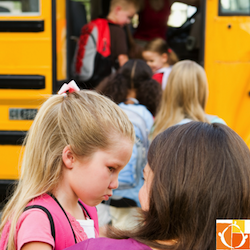A few years ago, a small miracle in learning occurred in the home of a single mom whose third grader melted down about his homework.
Karen had taken Jamal to the dentist. He'd missed two hours of school, and didn't know his homework assignment. Learning was a daily struggle for him.
When he realized that he couldn't reach his teacher, he exploded, upset about falling behind once again. He cried long and hard. His mom stayed with him. At the lowest point, he stormed from room to room, then crawled into their empty bathtub, sobbing in despair, and told her, "I'd rather go to the dentist every single day of the year than go back to school for even one day!" Karen had listened to Jamal's upsets before, and it had helped, so though it wasn't easy, she kept listening.
Then, after his worst feelings had been aired, his mind cleared. He brightened. He decided he would call the principal! He made the call himself, explained his situation, and asked her if she could contact his teacher for him. He was calm, polite, and ardent. The principal said she would try. Within fifteen minutes, his teacher called, gave him his assignment, and he put down the phone, victorious.

He had never before taken charge like that. He had never, ever wanted to do a homework assignment! He did his homework with energy and optimism, and handed it in the next day. It turned out to be a very good week at school!
This transformation illustrates a powerful tool for helping our children as learners. It's called Staylistening. It involves a new way of thinking about our kids' emotional moments.
Most of us understand that emotion can get in the way of learning and reasoning. But the conclusion many come to is that we need to sanitize the emotion out of our children's lives. Tamp it down. Stamp it out. Forbid it.
But our children, who learn much more quickly than we do, are passionate beings. They love. They play. When allowed, they approach learning whole hog. They'll do bike tricks till after sundown; they'll dance their way through the day. They grieve openly when they suffer a loss. They are outraged when another child insults them on the playground. Real growth can spring from each and every one of these situations. Positive feelings fuel a child's appetite for learning, and we're discovering that negative feelings provide a path to learning, too, when a parent can listen.
Current neuroscience highlights the fact that when we can't feel, our interest in life withers. We feel alone in the crowd, and our higher cortical functions -- among them, learning, judgment, and impulse control -- become muddied. The psychologist Louis Cozolino highlights the close relationship between emotion and learning:
It turns out that our emotional resilience and our ability to learn are inextricably interwoven.
So the issue is not that our children have big feelings! Of course they do -- and their sensitivity is part of what we love about them. To be learners, our kids just need a way to bounce back from their troubles. And that's where we can help. If we listen to their troubles with respect, we impart the message, "I know it's hard. And I think you can figure this out." When we back our children's intelligence, their intelligence will grow.
So when your child's pencil point breaks, and he bursts into tears saying that he can't possibly go to school with a broken pencil, experiment! He has chosen to cry; you can choose to Staylisten. See what your confidence in him can do! Here are some things to try, and to remember:
- Trust your child's mind. If he's crying, he's releasing negative feelings. The little issue he's upset about has tapped into a deeper crack in his confidence. Listening to him can help mend that crack.
It's not easy to listen, not easy to trust this wild and wooly process. We parents have our share of feelings, too! So getting ourselves in shape to listen to our kids' emotional moments is worth exploring.
The end result is well worth our trouble. Our children can surmount huge hurdles when they know, and feel, that they are loved and accepted, feelings and all. When we listen, we build our children's emotional resilience. And we power their minds.